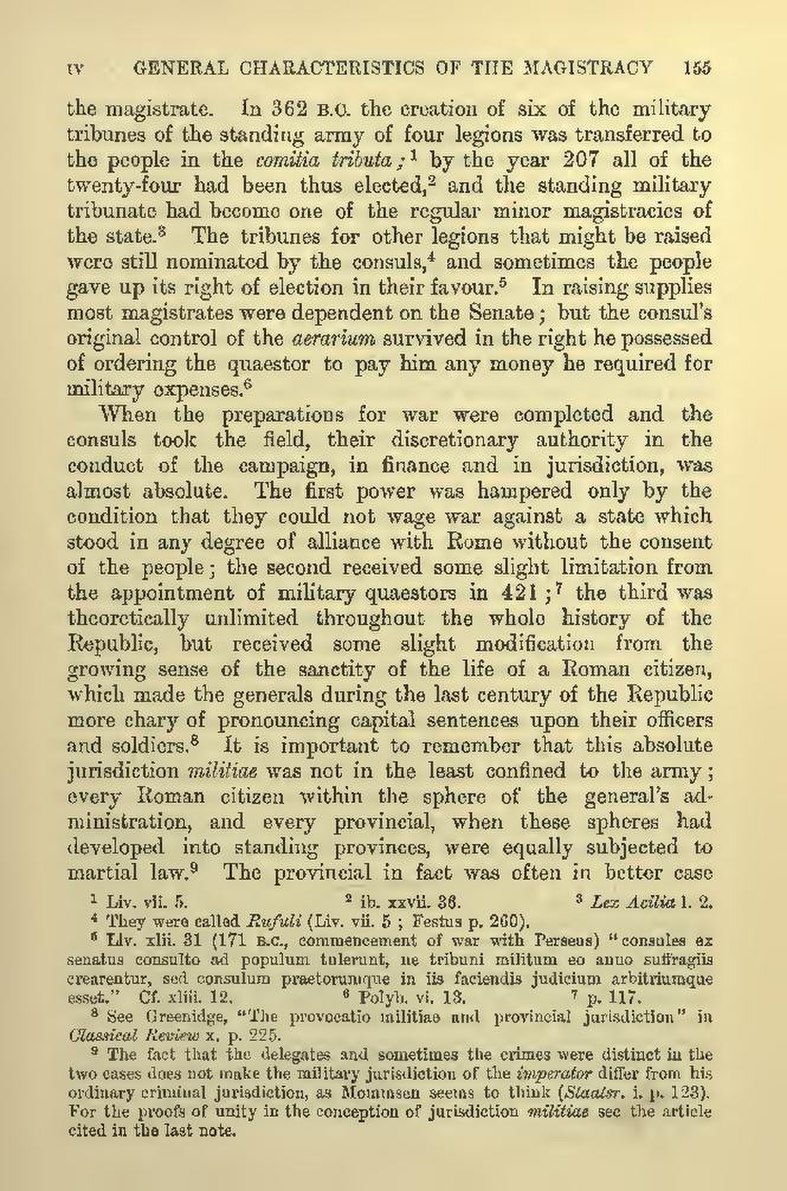the magistrate. In 362 B.C. the creation of six of the military tribunes of the standing army of four legions was transferred to the people in the comitia tributa;[1] by the year 207 all of the twenty-four had been thus elected,[2] and the standing military tribunate had become one of the regular minor magistracies of the state.[3] The tribunes for other legions that might be raised were still nominated by the consuls,[4] and sometimes the people gave up its right of election in their favour.[5] In raising supplies most magistrates were dependent on the Senate; but the consul's original control of the aerarium survived in the right he possessed of ordering the quaestor to pay him any money he required for military expenses.[6]
When the preparations for war were completed and the consuls took the field, their discretionary authority in the conduct of the campaign, in finance and in jurisdiction, was almost absolute. The first power was hampered only by the condition that they could not wage war against a state which stood in any degree of alliance with Rome without the consent of the people; the second received some slight limitation from the appointment of military quaestors in 421;[7] the third was theoretically unlimited throughout the whole history of the Republic, but received some slight modification from the growing sense of the sanctity of the life of a Roman citizen, which made the generals during the last century of the Republic more chary of pronouncing capital sentences upon their officers and soldiers.[8] It is important to remember that this absolute jurisdiction militiae was not in the least confined to the army; every Roman citizen within the sphere of the general's administration, and every provincial, when these spheres had developed into standing provinces, were equally subjected to martial law.[9] The provincial in fact was often in better case
- ↑ Liv. vii. 5.
- ↑ ib. xxvii. 36.
- ↑ Lex Acilia 1. 2.
- ↑ They were called Rufuli (Liv. vii. 5; Festus p. 260).
- ↑ Liv. xlii. 31 (171 B.C., commencement of war with Perseus) "consoles ex senatus consulto ad populum tulerunt, ne tribuni militum eo anno suffragiis crearentur, sed consulum praetorumque in iis faciendis judicium arbitriumque esset." Cf. xliii. 12.
- ↑ Polyb. vi. 13.
- ↑ p. 117.
- ↑ See Greenidge, "The provocatio militiae and provincial jurisdiction" in Classical Review x. p. 225.
- ↑ The fact that the delegates and sometimes the crimes were distinct in the two cases does not make the military jurisdiction of the imperator differ from his ordinary criminal jurisdiction, as Mommsen seems to think (Staatsr. i. p. 123). For the proofs of unity in the conception of jurisdiction militiae see the article cited in the last note.
